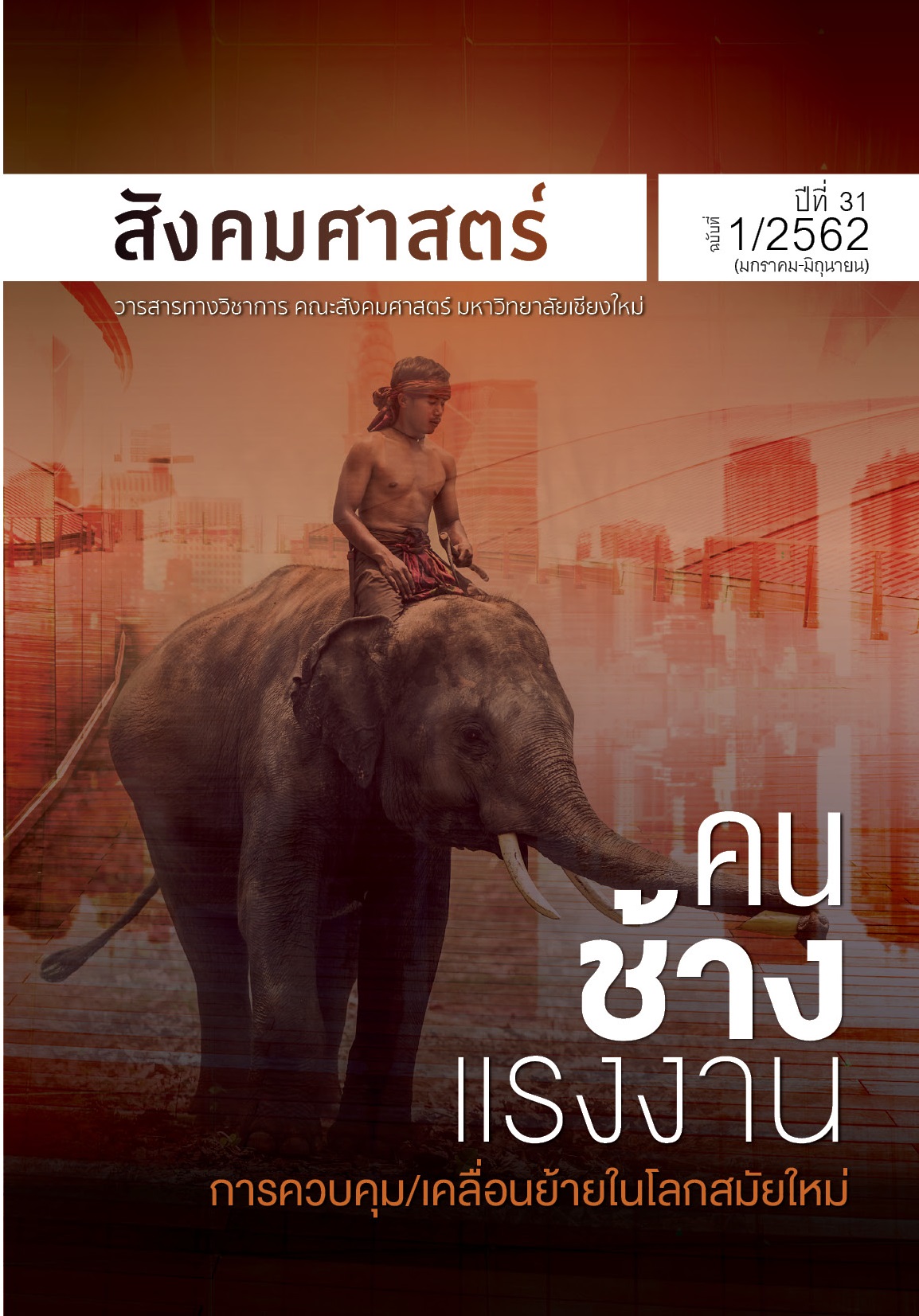Thai migrants’ Mobility and Illegality in South Korea
Main Article Content
Abstract
The mobility of Thai migrant workers to South Korea has recently become a pressing concern due to its increasing number of illegal labors and the impacts toward the host society. On one hand, despite the fact that both Thai and Korean governments have implemented several measures to mitigate the problem, the number of illegal migrant labors has not decreased. On the other, the pattern of illegal mobility has significantly changed over the past several years as a response to imposing legal measures and the emerging economic opportunities. This study illustrates the change of illegal Thai migrant workers through the lens of international labour migration and mobility. It aims to identify dynamism and factors influencing labour’s decision-making in regard to their illegality. The data is collected from in-depth interviews of the experienced labors, travel agents, government officers together with participant observation and documentary research.
The findings from the study show that the approach of Thai migrants mobility has mainly changed from formerly relying solely on illegal agents to traveling alone while having ‘the helpers’ at the destination. Compared with the past mobility, most of the recent illegal labors have higher education and younger age, especially those who just marked their first step as illegal migrants. Originally, people with economic-stricken background was the main group in seeking opportunities through illegal labour market. However, as the study shows from the recent mobility, the middle-class family with no debts also participated in this illegal labour market. Income still remains as a major decision-making factor, but other factors—the wider economic opportunities, the recognition of legal gap and mild punishment, the availability of information through online access as well as the experiences from traveling the world—also play a great roles in the changing pattern of illegal migratory practices.
Article Details
All written articles published on Journal of Social Sciences is its author’s opinion which is not belonged to Faculty of Social Sciences, Chiang Mai University or is not in a responsibility of the journal’s editorial committee’s members.
References
KBS WORLD. 2017. 2018 Minimum Wage Raised 16.4% to 7,530 Won. KBS. https://world.kbs.co.kr/english/news/news_Ec_detail.htm?No=128727 (accessed November 20, 2011).
กรมการจัดหางาน. 2560. กระทรวงแรงงานเผยสถิติเดือนพฤษภาคม คนงานไทยไปทำงานต่างประเทศเพิ่มขึ้น พบนิยมไปไต้หวันมากสุดกว่า 3,000 คน. กระทรวงแรงงาน. https://www.doe.go.th/prd /main/news /param/site/1/cat/7/sub /0/pull/detail/view/detail/object_id/74432 (สืบค้นเมื่อ 20 พฤศจิกายน 2561).
กองทะเบียนจัดหางานกลางและคุ้มครองคนหางาน กรมจัดหางาน. 2562. ผลจากดำเนินการป้องกันและแก้ไขปัญหาแรงงานไทยที่เดินทางไปทำงานเกาหลีใต้ ระหว่างวันที่ 11 กันยายน พ.ศ. 2561 ถึง 14 มีนาคม พ.ศ. 2562
งานพิธีการเข้าเมือง ด่านตรวจคนเข้าเมืองท่าอากาศยานกรุงเทพฯ. 2562. สถิติคนไทยถูกส่งกลับจากเกาหลีใต้ ตั้งแต่ปี พ.ศ. 2559 – 2561
ธนาคารแห่งประเทศไทยและกรมการจัดหางาน กองบริหารแรงงานไทยไปต่างประเทศ ฝ่ายทะเบียนคนหางานและสารสนเทศ. 2562. รายได้เข้าประเทศจากคนหางาน ปีงบประมาณ พ.ศ. 2561.
ประเสริฐ แรงกล้า. 2561. ชีวิตทางสังคมในการเคลื่อนย้าย. ปทุมธานี: บริษัทภาพพิมพ์จำกัด.
พรวิภา เหาตะวานิช. 2554. การปรับตัวทางวัฒนธรรมของผู้ใช้แรงงานไทยย้ายถิ่น. วิทยานิพนธ์ปริญญามหาบัณฑิต, สาขาวิชาจิตวิทยาการปรึกษา คณะจิตวิทยา, จุฬาลงกรณ์มหาวิทยาลัย.
พัชราวลัย วงศ์บุญสิน. 2553. การย้ายถิ่น: ทฤษฎีและความเป็นไปได้ในเอเชีย. กรุงเทพฯ: ศูนย์การศึกษาการพัฒนามนุษย์และการย้ายถิ่น วิทยาลัยประชากรศาสตร์ จุฬาลงกรณ์มหาวิทยาลัย.
เศกสิน ศรีวัฒนานุกูลกิจ. 2541. คุณภาพชีวิตการทำงานของแรงงานไทยในญี่ปุ่น : ศึกษากรณีแรงงานนอกกฎหมาย. ภาควิชารัฐศาสตร์ คณะสังคมศาสตร์, มหาวิทยาลัยเชียงใหม่.
สถานเอกอัครราชทูต ณ กรุงโซล สาธารณรัฐเกาหลี. 2561. ข้อมูลสถิติจำนวนคนไทยที่พำนักในต่างประเทศ ประจำปี พ.ศ. 2561 วันที่ 12 มีนาคม 2562.
สถานเอกอัครราชทูต ณ กรุงโซล. 2556. ความสัมพันธ์ระหว่างไทยกับสาธารณรัฐเกาหลี. สถานเอกอัครราชทูตไทย. https://www.thaiembassy.org/seoul/th/relation/31117-Bilateral-relations.html (สืบค้นเมื่อ 15 พฤศจิกายน 2561).
ข้อมูลจากการสัมภาษณ์
แอน (นามสมมติ). สัมภาษณ์, 9 เมษายน 2562
แป้ง (นามสมมติ). สัมภาษณ์, 9 เมษายน 2562
ส่ง (นามสมมติ). สัมภาษณ์, 10 เมษายน 2562
นคร (นามสมมติ). สัมภาษณ์, 10 เมษายน 2562
แคท (นามสมมติ). สัมภาษณ์, 11 เมษายน 2562


